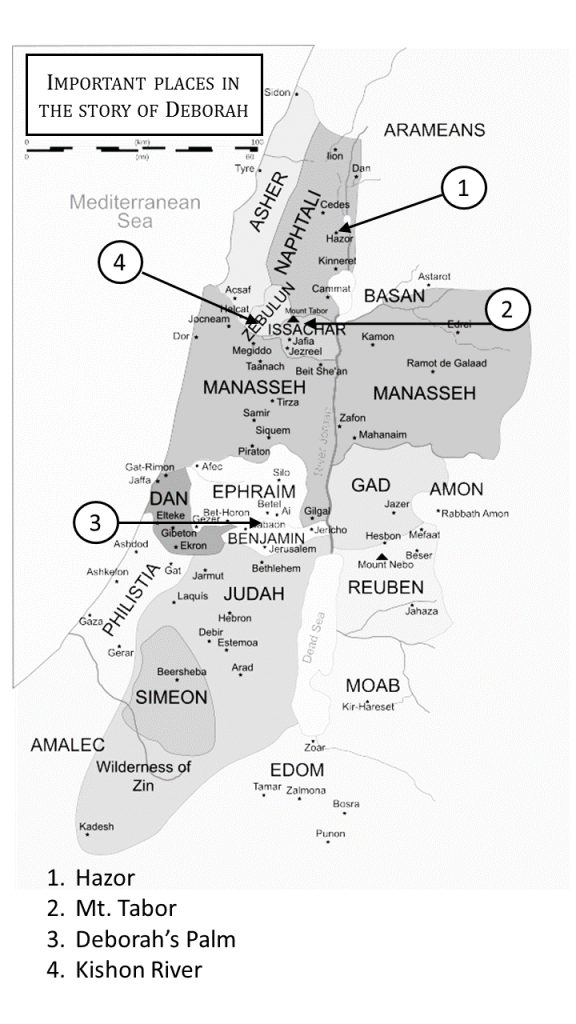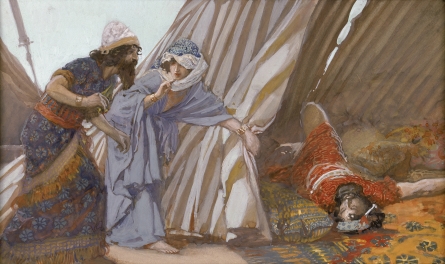She sent and called Barak the son of Abinoam out of Kedesh Naphtali, and said to him, “Hasn’t Yahweh, the God of Israel, commanded, ‘Go and lead the way to Mount Tabor, and take with you ten thousand men of the children of Naphtali and of the children of Zebulun?
I will draw to you, to the river Kishon, Sisera, the captain of Jabin’s army, with his chariots and his multitude; and I will deliver him into your hand.’”
Deborah’s palm tree stood between Ramah and Bethel, far to the south of Hazor and the Canaanite occupation. She lived in the tribal lands of Ephraim, and Hazor, as we mentioned, and reigned in the lands of Naphtali. This explains why “She sent and called Barak…out of Kedesh Naphtali.” Deborah tells him to assemble an army of ten thousand men from Naphtali and Zebulun. The map makes it clear why. Naphtali and Zebulun are the areas oppressed by Jabin. His capitol is located in tribal lands of Naphtali, and the major battle will be fought in the land of Zebulun.
From the earliest days, getting Israelites to leave their homes and fight for land allotted to other tribes had been  difficult. The song of Deborah and Barak in chapter 5 specifically mentions the tribes of Dan and Asher as two tribes which refuse to join. And although chapter 4 only mentions Naphtali Zebulun, chapter 5 says that the princes of Issachar were also with Deborah. Again the map makes clear why that is so. All of the fighting described in the two chapters takes place in the contiguous land of those three tribes: Naphtali, Zebulun, and Issachar. The men of these three tribes will be defending their own homes, their own families.
difficult. The song of Deborah and Barak in chapter 5 specifically mentions the tribes of Dan and Asher as two tribes which refuse to join. And although chapter 4 only mentions Naphtali Zebulun, chapter 5 says that the princes of Issachar were also with Deborah. Again the map makes clear why that is so. All of the fighting described in the two chapters takes place in the contiguous land of those three tribes: Naphtali, Zebulun, and Issachar. The men of these three tribes will be defending their own homes, their own families.
Deborah lays out the plan of battle in advance. Barak will take his army to Mt. Tabor. God, Deborah says, will draw Sisera and his iron-clad chariots to the Kishon river. Once the chariots are gathered, Barak is to attack. Deborah tells him that the Lord will deliver the Canaanite Army, with its chariots of iron, into his hand.
But Barak, whose name means “lightning,” is ironically reluctant to strike. He tells Deborah that if she will not go with him he will not go. He is not going to lead the Army, unless she comes, too. She agrees to come, but tells him that in that case, the honor for winning the battle will go to a woman. No doubt Barak thought the woman would be Deborah, and the reader is tempted to think that, too. However, it turns out differently.
Chapter 4 doesn’t tell us exactly how Barak and the Israelites defeated the Canaanites, but chapter 5 gives us a hint:
The earth trembled, the sky also dropped. Yes, the clouds dropped water.
Jabin assembles his chariots of iron in the river valley. So when the rainstorms came, all the water drained into that valley, saturating the ground and turning it into a trap for Jabin’s chariots. The weight of the iron on the narrow chariot wheels caused them to sink into the mire and be stuck, making the chariots a liability when Barak and his infantry attacked. The charioteers, armed for mobile fighting, not hand-to-hand combat, were ill-equipped to meet the Israelite foot soldiers. The initial attack rolled through the Canaanite ranks, its sheer momentum driving many Canaanites in0to the now-flooded river.
The river Kishon swept them away, that ancient river, the river Kishon.
Deprived of their mobile strike force, pressed against the river, unable to form an orderly retreat, the remaining Canaanite army abandoned the now worse-than-useless chariots and ran for their lives. As is often the case, the fleeing army is at the mercy of its pursuers, and Judges tells us that
…all the army of Sisera fell by the edge of the sword. There was not a man left.
This probably does not mean that literally every man died, because as we shall soon see, Sisera fled for his life. What it does likely mean is that the Canaanite army ceased to exist as a fighting force. It was every man for himself, and the Israelite soldiers take the hindmost.
Despite this great victory on the battlefield, Deborah’s prophecy about a woman receiving credit for the defeat of Sisera is about to be fulfilled.
The general, we are told, fled on foot—another indication of the totality of defeat—until he came to the tent of Jael. She was the wife of Heber the Kenite. Scholars dispute the exact location where this took place, but one suggestion is about halfway between Mt. Tabor and the Sea of Galilee. While we cannot be certain, this location makes sense because it would indicate that Sisera was fleeing back to Hazor.
In any case he felt safe here, for the Canaanites were not at war with the Kenites, who were nomadic. Rather than go to war, they would strike their tents and move on. So when Jael comes out of her tent and tells him to come in and that he need not fear anything, he believes her. Exhausted and dehydrated from his panicked retreat, he asks for water. Jael gives him milk. No doubt he is comforted by this. She is going beyond the mere minimum in supplying his needs. His stomach filled with milk, and his body exhausted from his flight, he falls into a sleep from which he will not wake.
A rabbinic tradition suggests that Sisera had raped Jael. The biblical texts gives no support to this notion, so far as I know. However, her actions bespeak some deep anger on her part, for she kills him in an extremely violent and personal fashion. As he lies asleep, she takes a tent stake and a mallet, and drives the stake through his temple, out the other side, and into the ground. On the one hand, it sounds pretty cold-blooded; on the other, it seems to me some strong emotion must be driving that tent peg. And her seeming indifference to her deed when Barak arrives suggests to me a suppressed rage.
Barak, trailing Sisera (once again, note the irony of “lightning’s” tardy arrival), shows up at Jael’s tent. There, the narrative portrays an eerily calm Jael.
Jael came out to meet him, and said to him, “Come, and I will show you the man whom you seek.” He came to her; and behold, Sisera lay dead, and the tent peg was in his temples.
Imagine yourself in Barak’s place. After a long day of battle and pursuit, you see a nomad’s tent. A woman comes out from it, and tells you that she has the one you seek. She walks calmly toward her tent. You follow warily, sword drawn. But when you enter the tent you see the coagulating blood pooled under his head, and then the tent peg protruding from his temple. You look at the woman with a new respect. This morning, Sisera was a fearsome figure, leader of an army, commander of three hundred chariots of iron. And now he lies dead in a nomad’s tent, conquered by an unarmed peasant woman.
At some point—perhaps then, perhaps later—it hits you that Deborah’s prophecy came true. You and your ten thousand men may have fought the battle, but a woman, this peasant woman, not Deborah, the judge and prophetess, or you, the man who led the army, will be forever credited with the conquest of Sisera. An exalted warrior killed in his sleep by a lowly woman. But then, as we shall see next time, the so-called “Song of Deborah and Barak” is really the song of three women.









